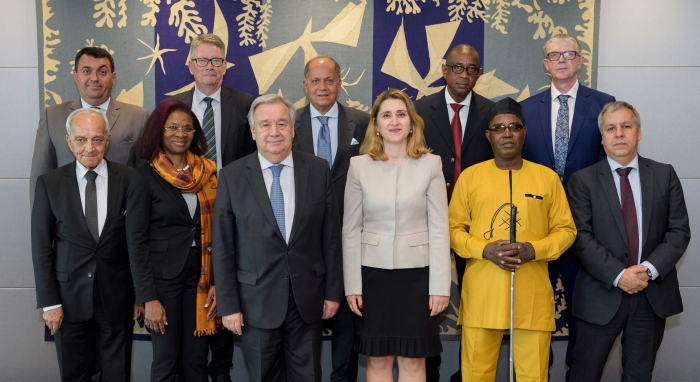All ten Chairs of the UN treaty bodies expressed their concern regarding the urgent need for adequate funding. Without the necessary resources, the treaty bodies will fall behind in their work, with dire consequences for the rights holders. They urged Member States to adequately fund the treaty body system from the regular budget in line with their commitment made in General Assembly Resolution 68/268.
Several Chairs emphasised that contrary to the predictable funding formula adopted for this purpose in GA resolution 68/268, the resources provided to the treaty body are not keeping pace with the needs of the system. The Chair of the Committee on Elimination of Racial Discrimination (CERD) stated that the CERD could not continue with the meeting time and human resources currently granted to it due to increased ratifications and number of actions as well as changes to procedures. Similarly, the Chair of the Chair of the Committee on the Eliminatiion of Discrimination against Women (CEDAW) indicated that, while the work of CEDAW had become even more complex in these challenging times, the human and financial resources of the OHCHR Secretariat had not kept pace with the exigencies. The Chair of the Committee on Enforced Disappearances (CED) remarked that ‘If nothing is done, our generation will be responsible for destroying a system of which the world has such dire need.’ The Chair of the Committee on Economic, Social and Economic Rights (CESCR) appealed to Member States to seek solutions in coordination with the Administrative and Budgetary Committee (Fifth Committee) of the General Assembly. This, he emphasised, was important as highlighted by the Co-Facilitators of the 2020 Review process ‘to achieve a concrete outcome [to the 2020 review] and complement General Assembly Resolution 68/268.’ The grave impact of funding deficits was also evident during the interactive dialogue with the Chair of the Subcommittee against Torture (SPT). The Chair indicated that no visits of the SPT had taken place in 2020 due the failure of the UN to provide necessary funds, clarifying that visits were cancelled even before the COVID-19 restrictions came into effect, during the last quarter of 2019 and the first quarter of 2020. The Chair of the Committee on the Rights of the Child (CRC) noted that previous gains made in addressing backlog were being eroded—the backlog of reports has increased from 39 last year to 64, meaning it would take at least two years for a report to be reviewed once received by the CRC. Furthermore, the backlog of individual communications to the CRC remains a concern given that six years after its entry into force, there are no dedicated human resources for this mechanism, creating an unsustainable situation and a significant challenge to the system.
Several chairs also raised the challenges of working in the context of the COVID-19 pandemic, which has led to an across the board stoppage of reviews of State reports. In July 2020, over 500 NGOs from all regions called on the treaty bodies and their Secretariat to resume reviews of States parties, which have been halted due to the COVID-19 pandemic. The joint NGO letter underlines that the suspension of reviews is having a disproportionate impact on the work of the Treaty Bodies, with the postponement, cancellation and scaling-down of nearly all sessions scheduled for 2020.
A number of States engaged actively in the dialogues with the Chairs. During the session with the Chair of the Human Rights Committee (HRC), the UK expressed its appreciation for the Committee’s commitment to improving the effectiveness and efficiency of treaty monitoring, including through the simplified reporting procedure and the agreement to better align working methods. The EU asked if the pandemic was affecting plans to put in place a predictable review calendar and for an update on the implementation of the Chairpersons’ paper on treaty body strengthening. The EU inquired about steps taken to ensure civil society can engage with the CEDAW in the context of the pandemic.
Some Member States used the opportunity of the dialogue to criticise the treaty bodies. During the session with CEDAW, Russia criticised the committee for using General Comments to give a broad interpretation of State’s obligations under the convention, and to promote ‘terminology’ which in their view ‘has not been agreed at the international level’. During the session with the Human Rights Committee, Russia questioned why complaints that were deemed inadmissible by the European Court of Human Rights were admitted by the Committee. During the session with the Committee against Torture (CAT), Russia expressed its hesitation in acquiescing to the formula in Resolution 68/268 for calculating necessary meeting time and resources, given that CAT was granted an extra session but the number of reports considered remained the same. This led Russia to conclude that the CAT was using the time allocated to them for functions not agreed upon by the Member States. The Chair clarified that the bottleneck was at the level of the secretariat as the allocation of funds by the General Assembly did not include a commensurate allocation of funds to the secretariat that would have enabled it to prepare the documentation for the CAT’s review. Egypt emphasised that capacity building should be prioritized and a better allocation of the financial resources of OHCHR are required to help State parties, especially developing countries build capacity for the preparation of reports.
We welcome the adoption by consensus of the resolution on the Human rights treaty body system. We regret that States were not able to ‘welcome’ the report of the co-facilitators of the 2020 review of the treaty body system. We urge all States to follow through with their reaffirmation of the formula contained in resolution 68/268, and allocate the corresponding financial and human resources in the Fifth Committee that the treaty bodies require to function effectively.
Contact: Madeleine Sinclair: [email protected]
photo: UN Photo/Manuel Elias




